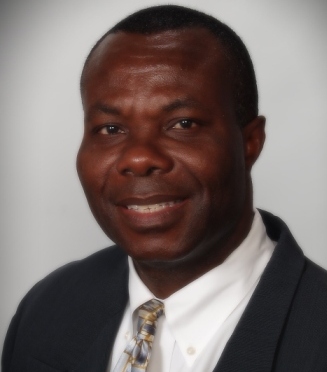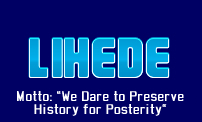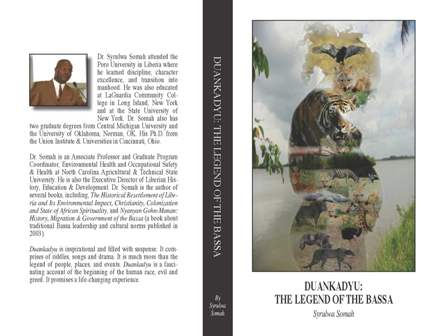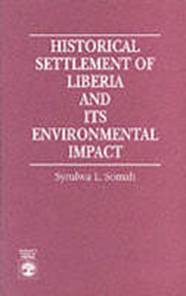![]() A Message From The Director Of LIHEDE
A Message From The Director Of LIHEDE
![]() Dr. Somah's Profile
Dr. Somah's Profile
![]() Dr. Somah's Speeches
Dr. Somah's Speeches
![]() Books Authored by Dr. Somah
Books Authored by Dr. Somah
![]() Honors and Awards
Honors and Awards

Syrulwa Somah, PhD
A nation endowed with abundant natural resources, fame, beauty, and wealth like Liberia must also have a defined national or international identity along with a definitive vision of its destiny in order to blossom like a flower spreading its sweet aroma. Since its declaration of independence in 1847 as a nation-state on the Black Continent, Liberia has struggled with conceptions of self-identity and unity of purpose while attempting to seek a balance between its Europe-centric and indigenous roots. As a result of this indecisiveness in carving out a common identity for itself, Liberia has undergone a number of changes of foci that have resulted in a variety of self-inflicting activities over 100 plus years, especially in the last twenty-five years. During this period (the last 25 years), Liberia went through some of the worst internecine struggles and civil strives because Liberians short-circuited themselves in not devoting ample time to establishing a common identity and destiny for the Liberian nation. Here lies the injustice in Liberia--our continual ignorance and neglect on our part to know and appreciate who we are, our rich culture, history, education and our unique diversity. We have not realized that we, as Liberian people, are -in way- travelers (Liberia), meaning that we cannot afford to leave one of the travelers behind or we get lost, delay or never arrive. The opposite can also be true: a self-denial---not accepting each other has not only made us far from being a wise people but a transgression beyond measurable proposition in our nation today. Such ignorance of our true history has deprived us possibilities and solutions to our national problems because we have wander far from where our corn is roasting. Such ignorance of our true history traps us in a social, economic and political pyramid characterizes by a one-way vertical historical education and destabilizes by Western acculturation, which encapsulates us from self-initiatives.
And today, Liberia, Africa’s oldest black republic, is desperately in need of housing, transportation, employment, health, education, and other opportunities to recover from the negative effects of the civil war. The Tunisia proverb cannot be far from the truth: if you respect your neighbor's difference, you may live in peace, but if you see the richness within the difference of your neighbors, you can not only live in peace but enrich yourself."
LIHEDE is born so that we can see our neighbor differences and enrich ourselves ------ because too long we imprisoned ourselves in a room with a door that is unlocked and opens inwards. It must now occur to Liberians that it is now time to pull rather than push the door, embrace change together because no man can sit down alone to plan for national prosperity. And once we acquire self-knowledge, discover our rich heritage and ancestral contributions to world civilization, we cannot only discover the secret to economic development and aggregate communalism, but also create virtuous leader who will rise with immense power against these forces of oppression.
Our first focus should be on education, and it will deal mostly with the need to restructure the educational system in Liberia to develop the manpower needs of Liberia within the context of Liberian values, culture, and development goals and aspirations. In essence, prioritizing education, health, and infrastructure development is the best way forward for Liberia in its national reconstruction and economic stabilization drives.
Education is generally the bedrock, the lifeline, or the wealth of any nation. But education cannot be the bedrock or lifeline of a nation unless education is structured to develop the productive capacities of people of the local culture or society. In other words, education must be able to train the citizens or students of a country not only to be statesmen and stateswomen, but also to honorably use the knowledge acquired at school for the attainment of power, selflessness, brotherhood, community involvement, nationalism, spirituality, and global awareness. And this means that the education offered in Liberia must be relevant to the development of goals and aspirations of Liberia by insisting on Liberian cultural values, norms, and mores. Education must be the local fountain of knowledge, as many educational scholars and psychologists have argued consistently that one of the things that separates human brings from animals is knowledge. Hence, knowledge is the oxidizer for the development, growth, and evolution of human beings worldwide. Yet the acquisition of knowledge mostly takes place through a national educational system backed by a curriculum designed to enable the learners to adequately cultivate their gifts and talents via the attainment of knowledge.
Consequently, education as a facilitator of individual knowledge and skill seeks to instill patriotism and nationalism in society, by removing all forms of hatred, racism, tribalism, sectionalism, fear, disease, poverty, and self-destruction associated with a lack of education or knowledge. And this is why many great nations of the world continued to invest heavily in education to serve as a social bond for national unity and development. Unfortunately, the education system in Liberia has played down Liberian cultural values and emphasized foreign values and ideologies so much so that many graduates of the Liberian school system are more familiar with French, German, English, American, and other Eurocentric studies and cultural values than Liberian and African studies and cultural values. As a result, many Liberians alive today are generally clueless about what it means to be a Liberian, as they tend to harbor no sense of patriotism and nationalism as Liberians. Most Liberians have no commitment or imagination regarding the present and future of Liberia because the Liberian educational system has failed to educate Liberians. It is against this backdrop that my administration is focused, first and foremost, to discuss and focus the promotion of Liberian authentic, well-blended or balanced history, culture, tradition at home, especially at our highest institutions of learning and in the lyceum of the world.
If Liberians hope to live together in peace as one people, then isn’t only time that we know something of the different cultures that make up Liberia, but if we want peace, we must say anything against it.
We must choose dialogue between the ethnicities of our nation to definitely realize a national need for an opportunity to remove the curtains of ambiguity, the main cause of cultural division amongst our people. It is indeed the most vital step towards mutual consideration without which national peace would be impracticable. I believe that if we support LIHEDE’s vision, it will create a nation of tranquility, and replace war and bloodshed with peace and brotherhood for mankind. The intent of LIHEDE is to dialogue via symposium, which is one of the most beneficial methods that can be exercised by all the ethnicities in order to create and achieve a mutual/national understanding.
I ask you to be a part of this effort by becoming a member, contributing, volunteering, telling us your area of expertise and projects you would like to contribute to. No one can claim that he alone can be the designer and the executer of Liberia prosperity. Each of us, as son and daughter of Liberia, is not only a secondary factor, but the main factor consists of the forces which work around us. Therefore, we must use intelligent decoders of the interplay of these forces so that we can build a healthy and prosperous nation. It is on this historical perspective that I ask you to find and encourage the best brains (sons and daughters) of Liberia to apply for membership.
Membership is welcome in LIHEDE without the need to break away from one’s current organization. LIHEDE prides itself on commitment, dedication, resourceful, quality and quantity in membership. When some of us whom God has blessed to read and write, live in other nations of the world, see how their citizens have collaboratively worked to build their nation, when our conscious minds awaken from our own moral depravity and spiritual stupor, we can be the genuine drum majors for the love for our nation. LIHEDE does not only have the heart of giant but thinks big and beyond what the doomsayers hold Liberia to. For the most part, Liberia's destiny is not and cannot be found in its civil government, but in the hands of all Liberians. In other words, it is the people who can change their nation not leaders. Please join me in this effort to begin looking for ways and means to learn our history, develop our nation and promote our culture.
Your friend and brother,
Syrulwa Somah, PhD
Executive Director, LIHEDE, Inc.
Biography
Dr. Syrulwa Somah is an Associate Professor of Environmental Health and Occupational Safety & Health in the School of Technology and the Coordinator of Graduate Studies at North Carolina Agricultural & Technical State University (NC&AT) in Greensboro, North Carolina.
Born in Kokoyah (1959), he was educated at LaGuardia Community College in Long Island, New York (A.A. in liberal arts) and at the State University of New York (B.S. in Labor Studies/Occupational Safety & Health). He also has two graduate degrees (MSA in healthcare administration) from Central Michigan University and (MLS in history and religion) from the University of Oklahoma. His Ph.D. is in policy studies with concentration on environmental and occupational health from the Union Institute & Universities in Cincinnati, Ohio. Dr. Somah has been involved with health and safety issues for the last seventeen years as a health and safety professional in areas of policy studies, municipal government health education, environmental health and safety education, lead risk assessment and abatement, and international health issues such as malaria and HIV/AIDS. He is a former Senior Occupational Safety & Health Specialist with the City of New York, New York, and Senior Environmental Compliance Specialist with the City of Greensboro, North Carolina. He has spent the last nine years teaching graduate and undergraduate courses in occupational safety and environmental health at the university level. Dr. Somah is author of several books, including The Historical Resettlement of Liberia and Its Environmental Impact; Christianity, Colonization and State of African Spirituality, and Nyanyan Gohn-Manan: History, Migration & Government of the Bassa, a book about traditional Bassa leadership and cultural norms, one of the sixteen major ethnic groups of Liberia.
Dr. Somah is also Executive Director of the Liberian History, Education, & Development, Inc. (LIHEDE), an organization he co-founded in 2003 with fellow Liberian compatriots Nat Gbessagee and Siahyonkron Nyanseor. Under Dr. Somah’s leadership of LIHEDE, the organization has hosted several annual symposiums and periodic workshops in the U.S. and Liberia on various development aspects in Liberia, particularly education, environment, women empowerment, health, and safety. The programs were held at NC A&T State University in 2003 and 2005. They were attended by representatives of Liberian government (MOH), the U.S. Center for Disease Control (CDC) and the U.S. Agency for International Development (USAID), and broadcast live via the Internet by Bent, a Canadian television company.
Under his leadership, through cash and in-kind donations from private sources, LIHEDE sponsored a five-member LIHEDE delegation to Monrovia, Liberia in December 2006. The delegates participated in the first National Health Conference on malaria treatment, control and prevention in post-conflict Liberia, which was organized and sponsored by LIHEDE in collaboration with the Liberian Ministry of Health & Social Welfare, Liberian Ministry of Youth & Sports, University of Liberia, Cuttington University College, and other institutions in Liberia.
In fact, LIHEDE had earlier presented a resolution from its 2005 malaria symposium to the U.S. and Liberian governments. So it was no surprise that during the National Health Conference, the US Embassy in Monrovia extended an invitation to the LIHEDE delegation to witness an announcement by President George W. Bush via satellite, naming Liberia as a focused country to benefit from the President’s Malaria Initiative (PMI) funds. As a focused nation, Liberia automatically became eligible to receive over $70 million in aid for malaria control and prevention efforts in Liberia from the PMI funds, Germany, Japan, China, WHO and other donors – with PMI accounting for $37.5 million of the total amount.
For instance, in 2005, LIHEDE signed a memorandum of understanding with two Liberian universities to begin a degree program in Liberian Studies based on a curriculum developed by LIHEDE, and one of the universities commenced a first degree program in Liberian Studies in 2006.
Dr. Somah has traveled extensively in Europe and Africa, including visits to Egypt, Guinea, Ivory Coast, Mali, Nigeria, Ghana, Belgium, and Switzerland. He has traveled to his native Liberia about fifteen times since 2003 on LIHEDE business. He speaks four languages, including English, French, Kpelle, and his native Bassa.
Areas of Specialization and Teaching:
- Environmental Health
- Occupational Safety & Health
- History and Religion
- Public Health
- Healthcare
- Research
- Curriculum Development
- Distance Learning/Web-based course design
- Ergonomics
Contact Information:
Email: somah@ncat.edu
Tele: 336-334-7586
Department:
NC A&T State University
Construction Management & Occupational Safety & Health
School of Technology
| August 27, 2011: | Seeding the Mother’s Tongue |
| July 26, 20011: | The True Meaning of Independence: Reflection of Our Yesterdays and Vision for Our Tomorrow |
| June 5, 2009: | Developing Local Talent for Capacity Building in Liberia: The Myth About Brain Drain |
| May 27, 2009: | Historical Preservation and National Food Security: The Way to Self-Development |
May 15, 2009: |
|
| April 18, 2009: | Loyal Opposition and Social Change in Liberia: A Historical Perspective |
| May 22, 2008: | Using Civil Dialogue & Civic Responsibility As Processes of Education in Liberian Democracy |
| November 18, 2007: | The Environment, Deforestation, and Human Diseases |
| December 15, 2007: | Speech delivered at Culture-Driven Malaria Program To download a copy of this speech click here |
| March 1, 2006: | 2006 EASTER’S MESSAGE |
Nyanyan Gohn-Manan: History, Migration, & Government of the Bassa
|
Duankadyu: The Legend of the Bassa |
Historical Settlement of Liberia and Its Environmental Impact
|
Dr. Somah and six others receive 'Teacher of the year honor' ![]()
Liberian Image Award Honors Several Liberian Including Dr. Somah ![]()




